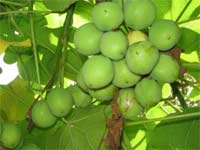If all goes well this summer, an Air New Zealand 747 jumbo jet will take off from Auckland this fall powered by fuel refined from the seed of a fast-growing weed.
The three-hour test flight could mark one of the more promising -- and more unusual -- steps by the financially strapped airline industry to find cheaper and more environmentally friendly alternatives to fossil fuel.
"We're confident that the test will go well," said David Morgan, Air New Zealand's general manager for airline operations, before leading visitors to a farm here where the weeds are being researched. If the flight is successful, "it'll be a real milestone not only for Air New Zealand but for aviation."
The secret: oil from poisonous seeds of the jatropha tree, which grows in warm climates around the world. For the last year, scientists here have been perfecting a process for turning the oil into jet fuel. On Wednesday, the airline announced plans to use the new fuel for 10% of its needs by 2013.
The jatropha oil is also significantly cheaper than crude oil. It could cost an estimated $43 a barrel, or about one-third of Wednesday's closing price of $122.30 for a barrel of crude oil.
The test flight is particularly noteworthy because it will come at a time when ethanol and other biofuels have come under increasing scrutiny because of their side effects. Production of ethanol has been blamed for corn shortages that have contributed to higher food prices. Other biofuels have been blamed for deforestation and contributing to global warming.
A partial solution may lie here on a hillside with a vista of Honolulu, where Air New Zealand and aircraft maker Boeing Co. have been working with Hawaiian agriculture experts to develop a strain of weed that could help the industry reduce its dependence on crude oil.
The weed, which resembles a fruit tree, can be grown virtually anywhere, doesn't need much water or fertilizer and is not edible. In India, the plants are mainly used as hedges to keep cows out of farm fields. In the U.S. some researchers, including one in Santa Barbara, have been growing the trees to process biodiesel that can be used in automobiles and factory machines.
"It's an ugly-looking plant, to be honest with you," said Lance Santo, an agronomist for Hawaii Agriculture Research Center, as he held a golf-ball-size nut that had fallen from a jatropha plant.
Within the nut were two seeds resembling peanuts. They contained 30% to 40% oil. Researchers looking at various crops discovered that the quality of jatropha oil was better than most for making jet fuel. Jatropha-based fuel also produces about half the harmful carbon emissions of fossil fuel.
Air New Zealand said its jatropha oil for the test flight would come from fields in southeastern Africa and India. The oil will be refined into jet fuel at an unspecified "hydro plant" in the U.S. that the carrier declined to name, citing competitive reasons.
For safety, the initial test flight will involve running only one of the four engines with the fuel. If the test is successful, the fuel will gradually be used on all of the engines in subsequent test flights.
Researchers here have found that an acre of the plant can yield about 300 gallons of oil, or five to seven times more than other potential feedstocks such as soybeans.

